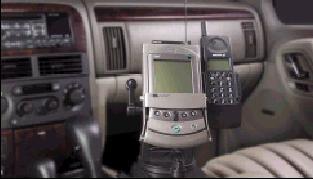Delphi Automotive takes Red Hat’s “un-Linux” for a ride
Jan 8, 2001 — by LinuxDevices Staff — from the LinuxDevices Archive — 4 viewsDelphi Automotive Systems has selected Red Hat's eCos operating system to be the software platform for a new family of in-vehicle information appliances and embedded telematics systems. The first Delphi product to use eCos will be the Mobile Productivity Center (MPC), an in-car platform that enables hands-free operation of PDAs and cell phones.
Thanks to its built-in speech recognition and text-to-speech system, the MPC allows drivers to use many PDA functions including notepad functions, access Internet content such as email and stock quotes, and dial phone numbers — all without taking their eyes off the road or their hands off the wheel. A docking station (see photo below) houses a Palm PDA along with a cell phone, and installs via several convenient mounting options.

Why eCos?
Interestingly, after Delphi turned to Red Hat for open source operating system support, they selected eCos — rather than Linux — as the embedded operating system for the MPC. eCos is an open source real-time operating system that was developed by Cygnus Solutions, a company acquired by Red Hat early in 2000.
Michael Tiemann, chief technology officer of Red Hat, says there were three main reasons why Delphi opted to embed eCos, rather than Linux, in the MPC . . .
- eCos is more economical than Linux in terms of the system resources it requires, and system component cost was very critical in the project.
- eCos was able to provide a Linux-compatible application program interface (API), something considered valuable by Delphi's engineers, via the EL/IX Linux API (championed by Red Hat); the result was compatibility with a well known, standardized interface (the Linux API), plus it makes it easy to upgrade to Linux in the future, or to reuse the same software in higher-end Linux-based Delphi products.
- eCos was also able to provide a second API — this one compatible with the µITRON OS — which Delphi considers key to penetrating the important Japanese automotive market.
Red Hat describes eCos as a highly configurable real-time OS that can satisfy the resource constraints of post-PC appliance-like devices that require a high degree of customization, minimized memory footprints, and yet may need hard real-time system performance. Red Hat says eCos' EL/IX API option lets programmers embed a Linux API in devices too small for Linux itself.
What's the memory footprint threshold where it makes sense to use eCos rather than Linux? According to Tiemann (see full interview) . . .
- “If your Flash and/or ROM space requirements add up to more than a half megabyte, then embedded Linux is probably the best starting point. If it's less than that, then eCos is probably better. However, size isn't the only issue to consider, because you can definitely have a very rich application stack which doesn't need a lot of OS functionality. Or, you may have a very small amount of software that requires exactly what's in the Linux kernel. In general, though, if you require more than half a megabyte for loading your application, Linux is a good choice.”
This article was originally published on LinuxDevices.com and has been donated to the open source community by QuinStreet Inc. Please visit LinuxToday.com for up-to-date news and articles about Linux and open source.